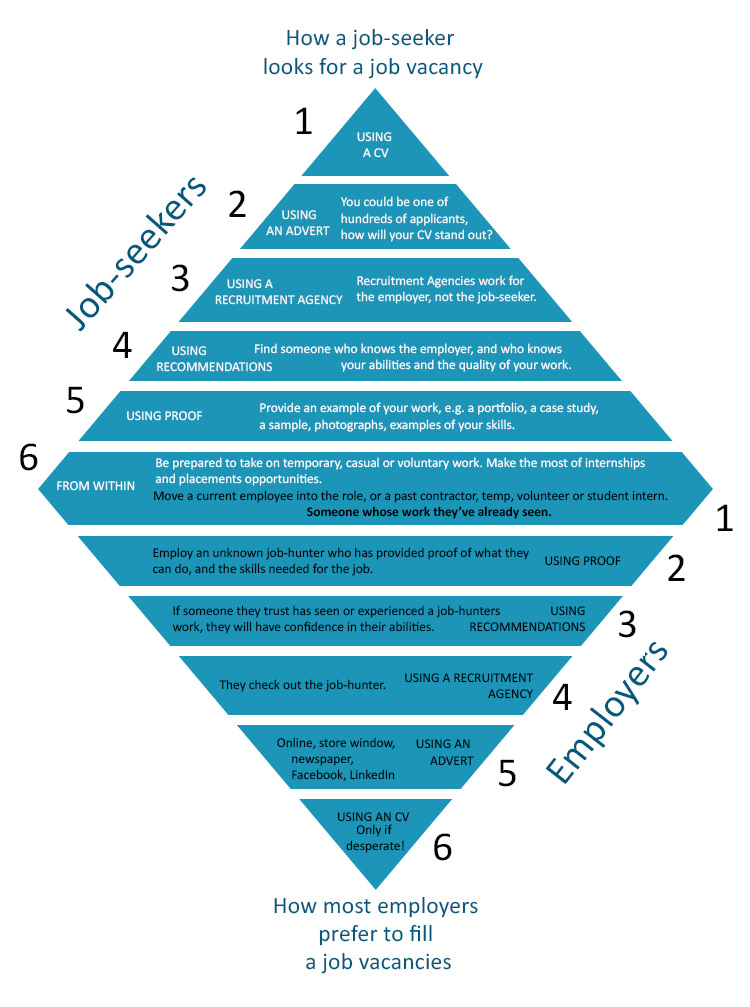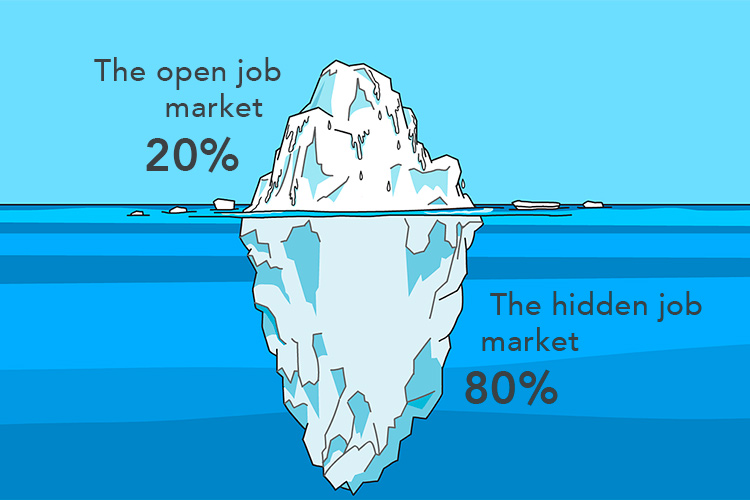Searching for a job
Stuck on where and how to find a job? Have you recently left or about to leave tertiary education, employment or wanting to get back into the field? This page will help you navigate your way in your search for employment.
A step by step plan
Making a job plan
The first step to finding a job is to set in place a job plan. A job plan is composed of goals you have set for yourself. It is best to start with small goals and move on from there.
Your plan could include the following steps:
A job plan
Search through websites and find 10 jobs that suit your interests, knowledge, skills and strengths. Discover which companies have the job(s) you are looking for and what skills and qualifications are required.
Ensure it corresponds with the job you are applying for.
This is very important as employers do take notice of your social media accounts and how you present online. If there is anything on these accounts that you would not want a prospective employer to see, remove it.
Use job search and recruitment agency websites, business websites, social media, and newspapers. Make sure you look at the job requirements prior to your application, as you can highlight these in your C.V.
Apply online, via email, post or deliver by hand.
Ask a friend, family member or colleague to help you build up your confidence and excel at the interview.
Ensure you wear professional clothing and arrive 10 minutes early, to show timeliness.
Create a job record
Create a record of what jobs you want to apply for to help you keep track of your current applications. Include the date of your application and the closing date as well as the company contact details, a small background of the company and the required skills for the position(s).
This record will be helpful when composing your cover letter and C.V, and can help enhance a positive impression on the employees during an interview as you have prior knowledge on the company.
| Job | Company | Number | Close date | Skills required | Company background | Actions |
| Barista- Casual position | Southern Bean Coffee | 021 1232 3456 | 5pm 7th April | One year experience as barista. | Started in 1997 by owner Steph Bishop as coffee roastery. First cafe opened 1999. 30 employees, Three cafes running in Otago. |
Emailed C.V and cover letter 5th April. Job interview on 12th April 1pm |
Motivation
The job search process can be draining at points due to unsuccessful applications. These setbacks are a reminder that the right job for you is out there and that each time you place an application you gain more experience.
- Have a job plan
-
Set daily goals
-
Keep your mind focused
-
Create a positive environment
-
Ensure you have a supportive network
The more C.V’s you hand out the higher chance of a successful application. Having a positive outlook creates a positive perspective, creating hope of a positive outcome.
The smart job search
Job hunting today has changed from the traditional job search. Job-hunters need to find new ways of thinking and different strategies in order to be successful. Having a qualification is no longer a guarantee of employment.
These days, employers tend to hire people they know, or people who know people they know.
Luck in job searching is no accident and you can do things to make your own luck. Networking in person and online can increase your chances of becoming known to an employer. The vast majority of job openings are unadvertised, part of the "hidden" job market. See the section Looking for a job - unadvertised vacancies.
Many employers are seeking their next employee BEFORE they need them.
When should your job search start?
-
Don’t wait until you have completed your studies to start your job search!
-
As soon as you start studying, you need to think about what sort of employers want people with the qualification and skills you are working towards gaining
-
You should then start building a relationship with those employers
-
This relationship could be developed by following and commenting on their LinkedIn profile and posts, attending industry events, making contact with somebody in the company, etc.
The social job search is alive and well. Networking and building connections is an important strategy – maybe the single most useful tool for a job search.
Don't wait until you have finished to start your search!

Graduate tips
Are you a graduate or about to graduate and are struggling to find work?
Here are a few tips to consider:
-
Talk with other graduates who have completed the same degree or similar on where they are working and how they got the job. This can give you an insight into what is needed to hold a job within this industry.
-
Have conversations with professionals in the industry you wish to pursue. Not only will this give you a better insight but also provide another possible network opportunity.
-
Consider an entry level experience position and build your way up to the higher position.
-
Contact the staff at OP Career Services Centre for access to help and support.
Looking for a job - advertised vacancies
When searching for an advertised job look in a variety of places, such as career websites, company websites, Facebook, and advertisements in the newspapers.
Online career websites
Career websites such as Seek.com and TradeMe Jobs can be useful tools in finding jobs to apply for.
When searching the sites you can filter the search results to make sure the results are relevant to you.
-
Specify the type of job you are applying for e.g. part/full time fixed/temporary term
-
Use keywords to narrow the results e.g. cafe, barista
-
Specify the location you would like to search.
-
Check the application closing date and time on job listings
Visit the Where to Search section on this page for links to websites.
Company websites
Visiting the website of the company you are interested in will give you more of a background on the company itself, what they stand for, and if their morals and values match with yours.
Many company websites also have a section for ‘careers’, ‘employment’ or ‘vacancies’. This will show you the current positions available and also who you can contact. If there are no positions available on their website you can always make contact and enquire about a position.
Advertisement in newspapers and supermarket notice boards
The local and national newspapers online and in paper format have a section advertising jobs. Each advertisement will contain a brief description of the position and the contact details to apply.
Local supermarkets usually have a notice board where employers post positions they have available.
Looking for a job - unadvertised vacancies
Accessing 'the hidden job market'
Many jobs are filled without any public advertising. This is often referred to as ‘the hidden job market’. Think about the jobs you have had in the past, how did you find out about these job opportunities? Did you respond to a job advertisement? Or did you find out about it some other way?
While you should definitely use career websites and newspapers, they shouldn't be your only sources as you could be missing out on up to 80% of jobs available. These unadvertised jobs are part of the hidden job market.

You find out about positions in the hidden job market through personal contacts, volunteer work, sending speculative letters, or walking into a business and making a personal enquiry.
The more people you know, who know you are looking for a particular type of work, the more chance you have of discovering an unadvertised job vacancy. Make use of your family and friends, but also your business and social contacts. For example, place a post on your Facebook and Linkedin accounts to notify your contacts of the kind of work you are seeking.
The sections below talk about ways to access the hidden job market.
Expanding your networks increases potential vacancy.
Professional Associations
Join the professional association appropriate to your area of study or career. You could also join the local Chamber of Commerce.
Student memberships are often available at discounted rates. Attending local meetings, industry events, conferences and seminars can be a good way to meet and network with people working in that industry who may know of new job vacancies before they get advertised. Search the internet for relevant associations and upcoming events in your field.
Volunteering
Doing some voluntary work experience for an organisation is a great way to get your foot in the door and to display your skills and enthusiasm.
If you are unable to find work experience through people you already know, then actively approach organisations who you are interested in working for. Find out as much as you can about the organisation before you approach them, so you can show a genuine interest in their current projects and organisation values. Talk about the skills and knowledge you have to offer and how you will benefit their organisation.
Work experience can also be a great chance for you to learn more about the different roles in your industry, and may help you to narrow down where you want to work and the type of work you want to be involved in.
Cold Calling
Contacting companies that you have an interest in and asking if they have any positions available can also get your foot in the door. Showing an interest and being enthusiastic will make you stand out, and finding out more about the company may help you in future job searches.
Cold calling can be done by making a phone call to the company, posting or emailing a cover letter along with your CV, or by personally dropping in to the workplace. You will be more successful if you make contact with the person who makes the hiring decisions - the manager, or the head of Human Resources.
Making that phone call or dropping into the business does take some courage, but can’t be as easily ignored as an email or letter.
Networking
Networking is an essential part of sourcing a vacancy, it is possibly the most effective form of job search. Ever heard of the saying “It’s who you know that counts”. This old saying still applies today so growing your network is well worth putting some effort into.
It’s good to start networking before you leave study so you have people you can contact when you leave. Talking with family and friends will let them know your interests and career aspirations but may also bring to mind a contact they might be willing to introduce you to. Previous employers and current or past colleagues may have knowledge of vacancies available, know of connections in the industry, or have new ideas about areas to pursue.
Attending networking events can put you in direct contact with people in the industry. But even if you don't have the chance to attend networking events, you still have an opportunity to connect with people and make a good impression throughout your day to day life.
Forming a list of people you have communicated with about possible vacancies available will give you a clearer perspective on where to go next. It will also give you an idea on who you may want or need to talk to.
Social Media
Social media is an increasingly important way to network and find employment opportunities. The key thing to remember with social media is; once you have put something on social media it is there for life and can have either a positive or negative impact on the way people perceive you.
Always ask yourself: what message does this send to a potential employer? Is this beneficial to me and my career advancement?
Using LinkedIn, you can see who your friends know, where people have been and what they’re interested in. You can also see what people are talking about and who’s gone from Company A to Company B. If you’re paying attention, LinkedIn can absorb at least thirty percent of your job-search-related research load. LinkedIn can save you hours that you used to have to spend at the library or on some corporate database, researching who’s who. LinkedIn is a job-seeker’s best friend.
Facebook is the second most popular social network for recruiters. According to a recent JobVite survey, 65% of employers use Facebook in their recruiting. So what is it you want people and potential employers to know about you?
Twitter is a terrific way to reinforce your personal brand by showing your professional expertise and helping people.
Not only is it a good way to establish your personal brand, but Instagram also demonstrates a marketable skill (social media) and enhances your overall digital skills.
Networking Do's and Don'ts
It might sound obvious, but many people avoid networking. Networking doesn’t have to be awkward or stressful. Volunteering, joining student societies and attending talks are good ways to network with your peers. You can also try networking events in the field you want to work in. Check out the social media feeds of organisations you’re interested in as they may well post about networking events.
Francesca Evers, people business partner at Virgin Management says: “Some people can be shy; networking is a chance to meet new people and have fun.” You might be shy, but networking really doesn’t work if you don’t speak to anyone. At most networking events there is usually some kind of presentation – use these moments to calm your nerves and as a helpful tool to think of questions.
Researching should be more than a quick Google. You need to know who is going to be at the event and what you might get out of it. Once you’ve found out who will be attending, try using LinkedIn and Twitter to find out more about the company or person you want to speak to so you can prepare some good questions to ask. It can help your nerves too.
Opening with “I’ve read your blog and I went to the same school as your kids”; can come off more stalker than well-researched. There is a fine line between well-researched and keen, and just plain creepy. Tread this line carefully.
People at networking events can be extremely busy and bombarded with people wanting to speak to them. If this is the case try giving a short pitch about who you are, your qualifications and what you’re interested in doing. But make sure to ask questions too. Remember people like to talk about themselves and what they do.
Some people get so anxious while networking that they forget how to act among other human beings. If you are speaking to someone, don’t dive straight in with ‘I want a job’ or interrupt other people if they are speaking – they will just think you are rude. And be careful with how much you drink. The beer and wine may be free and will probably calm your nerves but you want to be remembered for the right reasons!
You don’t have to be a business owner or employee to have a business card: it’s a good way of giving someone all your details. Include your email, mobile phone number and Twitter, LinkedIn or blog if you have them. There are many online companies you can use, or you could print your own. Try Moo - for fun cards that show your personality.
Never offer people your business card unless they ask for it. If a person wants your business card they will ask for it. If not, yours will end up in the bin. Know when it’s appropriate to share.
If a recruiter gives you their business card you have impressed them. But it’s important that you follow up. Send them a follow up message or tweet as soon as you can.
Where to search
Job search websites
Seek is composed of a diverse group of companies. Advertising jobs in your local area, you can refine it down by work type, position, salary, or area.
Trademe is currently the leading online marketplace and classified advertising platform in New Zealand for jobs on the market.
Indeed.com is constructed of thousands of employers looking for employees worldwide. Giving you the opportunity to select the Country of work, the type of work and select recently updated jobs available.
Student Job Search lists part-time, full time, and casual jobs aimed specifically at students.
Shopless Jobs is a free online marketplace, which includes a section for job advertisements.
NZ Government websites

Industry websites
Health and Education websites
Engineering, Trades and Industry training
Civil Aviation Authority of New Zealand
Connexis - Infrastructure Industry Training Organisation
BCITO - Building and Construction Apprenticeships
Seeking help
Contact the Career Services team at OP for support and help with your job seeking journey. They can help with CV’s, cover letters, interview skills and more.
Social support agencies
Youth services
If you are aged 16-18, Youth Services will guide you in career decision making.
Work and Income
If you are over the age of 18 and in need of finance and job search support Work and Income can be of help.
Workbridge
Workbridge is a specialist employment service that gives employers access to a wide talent pool of people with a disability, injury or illness. If you have suffered or are suffering from any disability, illness, or injury, they can help you in the job search process.
Career Services
H Block, Dunedin
0800 762 786
careers@op.ac.nz
References
https://www.youtube.com/watch?time_continue=2&v=QnHyEH33yHM
Attributions
Hero image: Green grass. pixabay.com. Image retrieved from: https://www.pexels.com/photo/nature-grass-plant-dew-53615/ Licensed under a Creative Commons CC0 1.0 Universal license.
(1) Image: Iceberg above water by MoteOo. Retrieved from https://pixabay.com/en/iceberg-above-water-white-cold-3273216/ Licensed under Creative Commons CC0




